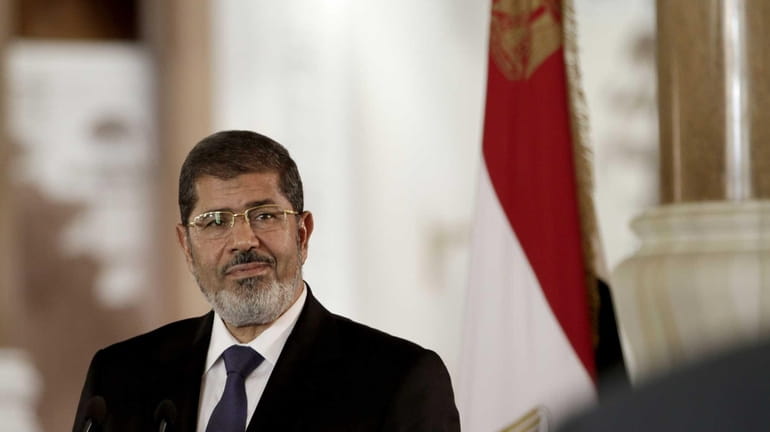Feldman: Mohamed Morsi turns to tyranny to save Democracy in Egypt

Egyptian President Mohammed Morsi speaks to reporters during a news conference at the Presidential palace in Cairo, Egypt. (July 13, 2012) Credit: AP
Is democracy in Egypt over before it started? Skeptics abroad and protesters in Egypt think so after President Mohamed Morsi's unilateral decree that his decisions are not subject to judicial review by the nation's constitutional court.
The fears are exaggerated -- this is not the scene in the movie where the democratically elected Islamic leader reveals himself as a religious dictator.
Morsi overreached in his decree and explained it poorly. Yet he did it in the service of preserving electoral democracy. And he has reportedly taken a first step to repair the damage: agreeing to limit the scale of the decree to "sovereign matters," such as protecting the assembly now writing Egypt's constitution.
The concerns of Egyptian and foreign secularists are understandable.
Democracy means more than just elections. Those elected by the people must adhere to constitutional procedures, not take the fact of their election as a mandate to govern without restraint. When Morsi stated that he would not be bound by the decisions of the constitutional court because "God and the people" had chosen him, he sounded disturbingly like Ayatollah Ruhollah Khomeini -- or like a fascist dictator.
Yet, despite appearances, Morsi's decree does not represent the "one man, one vote, one time" scenario many consider inevitable when an Islamist party comes to power through democracy. One must consider the full context of Egypt's tumultuous, ongoing revolution -- and the highly questionable role Egypt's constitutional court has played in it.
Under President Hosni Mubarak, the constitutional court enjoyed a good reputation for moderating dictatorial rule. Critics contended that it was little more than a rubber stamp for the regime, but its defenders rightly pointed out that it was still more impressive than any other constitutional body in any Arab state.
Since Mubarak fell and the Islamists were elected, the court has actively tried to constrain the government.
The impulse may have been public-spirited at first, but it quickly descended into anti-democratic partisanship on the side of the army. The culmination of the court's efforts came when it dissolved the elected legislature in June. In a subsequent interview, one of the court's justices admitted that the court was on the side of the military regime all along and prepared its rulings against the legislature from the moment the elections took place.
There is good reason to think that the court was poised to dissolve the elected constituent assembly, just as it dissolved the parliament -- one more step toward declaring the presidential election invalid and creating a constitutional coup d'etat against Mursi.
Make no mistake: The result of any such action by the courts would be to assure the continued power of the military leaders, who have not accepted the results of the elections. The struggle between the elected Islamists and the army is not over.
Properly speaking, Morsi's decree is part of that struggle. Perceiving the court as a tool of the military, he was trying to take it out of the game pre-emptively.
Yet the means Morsi adopted were naive -- and they backfired badly. Nothing in the interim constitution, or in general constitutional principles, allows the president to ignore a court's constitutional judgment.
What Morsi should have done was turn to the constituent assembly itself. With no permanent constitution in place, it is the assembly that embodies the will of the people, not the president. If sovereignty lies anywhere in such a period of post-revolutionary uncertainty, it is with the collective body chosen to make the new ground rules.
If the constituent assembly declared that it could not be dissolved by the constitutional court, it would have a credible constitutional argument as well as a powerful political one. Many constitutional experts would say that a constituent assembly can do anything it wants, so long as it does not violate fundamental human rights. Certainly it would be within the power of the assembly to abolish the court in a final, ratified constitution. It follows, then, that the assembly should be able to protect itself against a usurping court.
Morsi would have been wiser to issue a limited decree announcing prospectively that the assembly would remain in force and in office even if the courts tried to dissolve it. By appearing instead to place himself above the law, however, he undercut the very democratic ideal to which he should have appealed.
Having now agreed to limit the scope of his decree, Morsi should also clarify that he is not claiming any inherent authority for the presidency, but is simply affirming the principle that the constitutional court cannot dissolve the constituent assembly. This would send a signal to supporters of democracy in Egypt and abroad that Morsi wants to uphold the democratic process, not subvert it.
Right now, Morsi has substantially weakened his domestic legitimacy, generating for the first time violent protests against him.
Internationally, things are worse: Coming on the heels of his public support for Hamas, Morsi has made himself look like a dictator in the making.
Democracy is not yet dead in Egypt. But Morsi must do more to demonstrate that he still believes in the system that brought him to office.
Noah Feldman, a law professor at Harvard University, is a Bloomberg View columnist.
